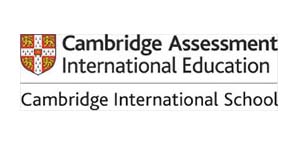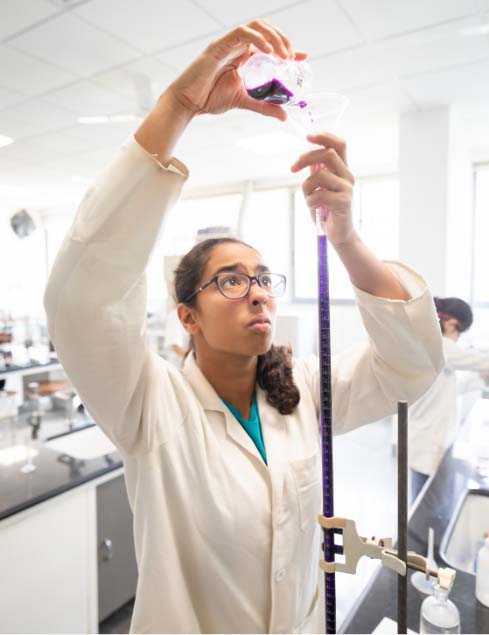The school follows the PYP (Primary Years Programme) and IBDP (International Baccalaureate Diploma Programme) at the Primary and High School level, both of which are very strong strands of the International Baccalaureate and the Cambridge curriculum from Grade 5 to 8 which culminates with the IGCSE in Grade 9 and 10.

The Primary school (Nursery to Grade 2) aims to create a joyous, nurturing and vibrant space that stimulates the child’s curiosity and imagination and fosters her instinct for exploration and inquiry. We focus on the child’s Swabhav (basic nature and instincts) to enable her to develop a robust sense of self and others as she interacts with and explores her environment. We nurture the whole child by facilitating her social, emotional and academic development. She gains practical hands-on experiences which link her learning to the real world.
The focus is to help them centre themselves in their inner being, to comprehend their emotions and feelings, and to learn to manage and express them productively. The literacy and numeracy development is integrated through holistic concrete experiences. Our classrooms are student-centred with children following a differentiated, personalised curriculum, delivered in small groups. The experience of undertaking ‘expeditions’ enables students to develop a mastery of grade-level skills and content while bringing the curriculum to life.
The Heritage International Xperiential School strives to inculcate independent learning skills, encouraging children to take responsibility for their own learning. From the very beginning they are given opportunities to chart their own path and assess their own performance so that they do not need external motivation, direction or moderation. Additionally, natural materials are frequently incorporated in the learning experiences, which provide an opportunity for richer play and sensory development due to variation in types of textures, colours, smells, and sizes. The props present open-ended opportunities, encouraging children to engage with them in their own unique manner and apply their imagination.
Educators at Heritage International Xperiential School employ thinking routines and mini-strategies that guide and support student thinking, as the school believes that thinking skills required for synthesising, analysing or critically evaluating ideas can be learnt if well-researched routines and approaches are used consistently. These ensure that our children deepen their thinking and constantly stay motivated to learn.
The primary curriculum is founded upon Heritage’s experiential learning curriculum with resources from the International Baccalaureate® Primary Years Programme. The programme places a powerful emphasis on inquiry-based learning, students’ academic, social and emotional-well-being and critically on international-mindedness and strong personal values. It nurtures independent learning skills, encouraging every student to take responsibility for her own learning.

We are also inspired by the work of International Primary Curriculum

Students of Grades 5,6,7 and 8 are part of the middle school and we follow the Lower Cambridge Programme in Grades 6,7 and 8 that culminates in a Cambridge Checkpoint in Grade 8. Our middle years programme focuses on in-depth trans-disciplinary learning expeditions that connect student's mastery of skills and content to real life issues and purposes. They work together to make the world a better place.
The Middle School Programme is structured to meet the varied intellectual and developmental needs of the children. The primary goal of the curriculum is to develop skills related to writing, reading, reflecting, critical thinking and public speaking fostering among students a desire to acquire knowledge with their initiatives. The educational philosophy encourages students to gain a wide range of first-hand experiences through the expeditionary nature of the curriculum. Group activities develop in students the ability to lead effectively and adapt to various roles within a team for the successful completion of a project, activity or service task. Social Emotional Learning plays an integral role in helping them address their age-specific interests and concerns, in addition to raising awareness and building a compassionate and ethical character.
The IGCSE curriculum at HIXS is aligned with the Heritage vision. It helps our students to think globally and act locally equipped with knowledge, understanding and skills of 21st century citizens. It combines the understanding of a broad range of subject content with the application of values both within and outside the classroom, and sets clear goals for students and teachers. The Cambridge programme is committed to helping our diverse student body increase its competence, expand its academic horizons and enrich its values.
The Cambridge curriculum (IGCSE) provides a strong and a seamless transition from middle school to IBDP by providing substantial content and requisite skills in terms of breadth and depth in nine subjects or more to take on the challenge of the IB DP. This is an established model across the best international schools in India such as The British School, Dhirubhai Ambani International School and Aditya Birla World Academy. Some top schools internationally that follow this model include SevenOaks (UK), The Westminister (Dubai), and King’s College (UK).

The Senior School consolidates the learnings of earlier years to develop young adults who have excellent breadth and depth of knowledge; flourish physically, intellectually, emotionally and ethically whilst excelling in traditional academic subjects. There is greater emphasis on building an international spirit and the 21st century skills of communication, critical thinking, creativity, collaboration and leadership that will serve these young men and women well as they prepare to step out into the world beyond the school gates. The programme embraces the free exchange of ideas, harnessing the creative energies of these young adults in a learning environment rich in dialogue and collaboration.
The Senior School comprises grades 9 to 12. In grades 9 and 10 we follow the IGCSE (International General Certificate of Secondary Education) Programme. In grades 11 and 12, students follow the IB DP (International Baccalaureate Diploma Programme).

The International Baccalaureate® (IB) Diploma Programme (DP) is a demanding pre-university course of study that leads to external examinations and is designed for highly motivated students aged between 16 and 19. Through the DP, schools are able to develop students who have an excellent breadth and depth of knowledge and thrive physically, intellectually, emotionally and ethically.


| Subjects offered in Grades 9 and 10 | ||||
|---|---|---|---|---|
| Group 1 (Languages) | Group 2 (Humanities & Social Sciences) |
Group 3 (Sciences) |
Group 4 (Mathematics) |
Group 5 (Creative, Technical & Vocational) |
| First Language English (Compulsory) | Literature in English (Compulsory) | Physics | International Mathematics (0607) | Art & Design (0400) |
Any one: of the following:
|
Global Perspectives (compulsory) | Chemistry | Additional Mathematics (0606) (optional) | Business Studies |
| — | History | Biology | — | Computer Science |
| — | Economics | — | — | — |
| Subjects offered in Grades 11 and 12 | |||||
|---|---|---|---|---|---|
| Group 1 | Group 2 | Group 3 | Group 4 | Group 5 | Group 6 |
| English A
Language & Literature (HL/SL) English Literature (HL/SL) |
Second Language
Hindi B SL French B SL French Ab Initio Spanish B Sl Spanish Ab Initio |
Individuals and Societies HL/SL
History; Economics; Business Management; Psychology; ESS SL* |
Experimental Sciences HL/SL
Biology; Chemistry; Computer Science; Physics; ESS SL* |
Mathematics
All four choices Math Analysis & Approaches HL/SL Math Applications & Interpretations HL/SL |
The Arts
Visual Arts HL/SL |
In addition to subjects from varied groups, students fulfil the IB core requirements of the Extended Essay (EE), Theory of Knowledge (TOK) and Creativity, Activity, and Service (CAS) to earn a diploma.
The Extended Essay is a teacher supervised research paper of up to 4,000 words, giving students an opportunity to conduct independent research or investigation on a topic from a subject that interests them.
Theory of Knowledge is an interdisciplinary course that helps students reflect on the nature of knowledge and develop an evaluative approach to academics and real life situations employing critical thinking.
CAS (Creativity, Activity and Service) enables students to enhance their personal and interpersonal development through experiential learning. Students are actively engaged in creative activities that serve their local
or global communities through creative, sports and service projects of their own.
 Message us
Message us
 TOP
TOP